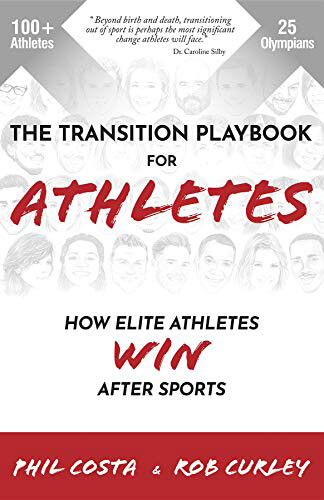- May 29, 2019
- By Annie Krakower
Not every athlete makes it big, but take it from a former NFL player, an Olympic medalist, a professional bodybuilder, a triathlete: Even the superstars eventually have to hang up their cleats—or gloves, goggles or leotards.
After the final whistle blows, what’s next?
“The Transition Playbook for Athletes: How Elite Athletes Win After Sports,” a new book by Phil Costa ’09 and Rob Curley published today, provides answers from the stars themselves. Over 100 former elite athletes from 30-plus sports offer lessons on how they went from the playing field to law firms, boardrooms, medical school and more.
 “It shows how passionate a lot of these athletes are about this issue,” Costa said. “This is just a topic that touched them deep.”
“It shows how passionate a lot of these athletes are about this issue,” Costa said. “This is just a topic that touched them deep.”
That includes Costa, who played four years of football as a Terp, starting every game at center as a senior. He signed with the Dallas Cowboys in 2010 and notched four seasons with them, feeding snaps to quarterback Tony Romo.
But as the injuries piled up— a fractured back, a dislocated ankle, torn-up knees—Costa’s playing time dwindled. Just weeks after signing a contract with the Indianapolis Colts in 2014, he retired at age 26, with no clear path of where to go from there.
“I struggled with the transition,” he said. “I did not think I would—I did get good grades in college, I was an honor-roll student. I think it hit me even harder than most.”
Realizing he’d need some help, Costa met with experts in various fields: lawyers, broadcasters, doctors, politicians. He eventually became a pacemaker sales representative with St. Jude Medical and Abbott before earning his MBA at Columbia Business School in 2018. These days, he’s learning Spanish in Madrid.
Costa’s struggles to find his way mirrored those of his childhood friend Curley, who had played pro football in Europe. The pair did find books meant to help athletes transition out of sports, but they encountered one of two problems: They were either lengthy academic works that were difficult to wade through, or biographies by former athletes with hundreds of pages of background and little room left for actual advice.
Costa and Curley sought to avoid both extremes. “The Transition Playbook” features one- to two-page snippets from each athlete—including more than 25 Olympians—broken down into subsections like “Inspiration,” “Failure” and “Guidance.” Costa, for instance, recounts how rejection after football motivated him, and he encourages reaching out to multiple people in multiple fields.
“We had enough content to make this an 800-page book. It was fun to pick out the best advice,” Costa said. “It’s Twitter-sized information. We want athletes to be engaged.”
High schools, colleges and even some professional organizations have expressed interest in the book, with all pre-sale proceeds being donated to the AthLife Foundation, which helps schools provide student-athletes with mentors for success beyond the sport. The authors suggest that readers mark up their copies and take note of which former athletes resonate with them.
“It was super important for us to be diverse with this book, because athletes are diverse,” Costa said. “We want to make it the go-to book.”
Topics
People